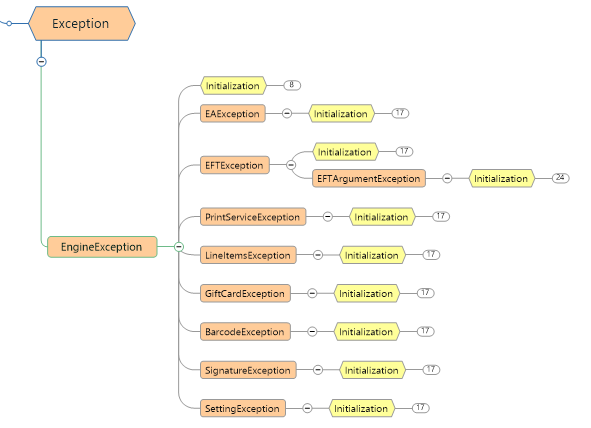Engine Exceptions
In this article
When things go wrong LS Pay will throw exceptions. To make it simpler to handle exceptions, LS Pay has its own base exception, EngineException, and all exceptions thrown will be of this type or derive from it.
Tip: In all instances, you can access more details by viewing the error message.

EAException
Exceptions thrown in the EAManagement or linked with connection problems will be of the type EAException, if there is something wrong in the communication with the POS, the cardholder, or the PED. The exception class has a set of enum error codes (EAErrorCode) describing why an error was thrown and you can use these for localization in the POS.
public enum EAErrorCode
{
Unknown, // An unknown error has occured, not able to categorize it.
DeviceIsBusy, // The device is busy.
UnknownEAManagementType, // An unknown External Accessory Management type selected
ConnectionTimeout, // The connection timed out before or after inital connection was made
ConnectionInterupted, // Connection lost after initial connection was made or when request has been sent to device and no response has been received
FailedToConnect, // There is no connection and there was no initial connection made, can also happen when request is sent
DevicePairingNeeded, // A pairing function is needed before this action
PairingError, // An error occured in the pairing process
PairingCodeMismatch, // A mismach between pairing codes
BatteryTooLow, // The battery is too low on the device, action not possible at this moment
SessionInProgress, // A session is already in progress
ConfigurationError, // Configuration error
CommuncationFailure, // Failed to send or receive a response from the PED
CouldNotParseData, // Could not parse data from the PED
NotSupported, // Action or process not supported
MissingInformation, // Missing settings or any other information the device needs
CouldNotConnectWithHostThroughTerminal, // Could not connect with host through terminal
DLLMissing, // Could not load DLL
}
EFTException
EFT exceptions thrown will be of the type EFTException, if something occurs in the transactions for electronic fund, authorization, void, refund and so forth. The exception class has a set of enum error codes (EAErrorCode) describing why an error was thrown and you can use these for localization in the POS.
public enum EFTErrorCode
{
Unknown, // An unknown error occured, not able to categorize
RequestArgumentError, // An argument exception is thrown
NoSession, // No session is active.
FailureToStartSession, // Failed to start a session
FailureToFinishSession, // Failed to finish a session
TransactionNotFound, // Transaction cannot be found
UnsupportedOperation, // Operation is not supported
CorruptedDataReceived, // Service has received corrupted data
UnexpectedResultReceived, // An unexpected result value was received in the response.
NotSupported, // Not supported request sent in
DataMissing, // Data missing that was expected
UnexpectedDataReceived, // Data received is not what was expected
Timeout, // Timeout while waiting for customer
InvalidOperation, // Transaction already in progress
}
BarcodeException
Barcode exceptions thrown will be of the type BarcodeException. The exception class has a set of enum error codes (BRErrorCode) describing why an error was thrown andyou can use these for localization in the POS.
public enum BRErrorCode
{
Denied, // Barcode connection denied
PowerOnFailure, // Could not power on the barcode reader
Cancelled, // Action cancelled
Unknown // An known error occured, not able to categorize
}
LineItemsException
Line item exceptions thrown will be of the type LineItemsException. The exception class has a set of enum error codes (LineItemErrorCode) describing why an error was thrown and you can use these for localization in the POS.
public enum LineItemErrorCode
{
Unknown, // An unknown error occured, not able to categorize
NoData, // No data was received
Mismatch, // Mismatch in data given
InvalidCobination, // Invalid combination
FieldRequired, // Field required
InvalidField, // Invalid field or decoding failed
Exists, // Line item already exists
NotExists, // Line item does not exist
InvalidValue, // Not valid value for field
CannotBeNegative, // Field value cannot be negative
MustBeGreaterThan // Field value must be greater than 0
}
EFTArgumentException
The argument exception as an inner exception of EFTException. The exception class has two additional variables:
- ParamName of the type enum
- ActualValue holding information regarding why the error is thrown.
public enum ParamName
{
CurrencyCode,
AmountBreakdown,
TotalAmount,
CashbackAmount,
TipAmount,
TransactionType,
TransactionId,
EFTTransactionId,
AdditionalId,
Other,
Surcharge,
}
Example: Catch ArgumentException in Android application:
try
{
updateResult = settings.UpdateValue(setting.Key, editBox.Text);
}
catch (ArgumentException ae)
{
using (var builder = new AlertDialog.Builder(this))
{
builder.SetMessage(ae.Message);
builder.SetPositiveButton("OK", (s, a) => { });
var myCustomDialog = builder.Create();
myCustomDialog.Show();
}
}
SettingException
Setting exceptions thrown will be of the type SettingException. The exception class has a set of enum error codes (SettingErrorCode) describing why an error was thrown and you can use these for localization in the POS.
public enum SettingErrorCode
{
InvalidKey, // An invalid key was sent in, not recognised
DataTypeMismatch, // Wrong type of data received
ReadOnly, // Value is read only, not possible to alter
Unknown,
}